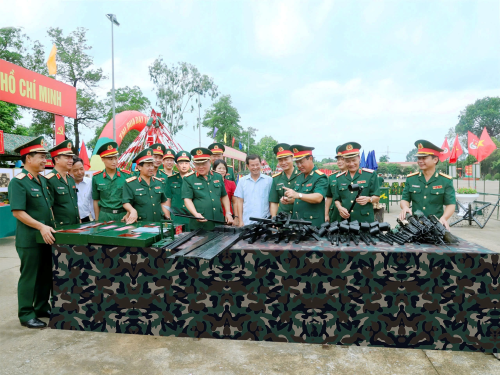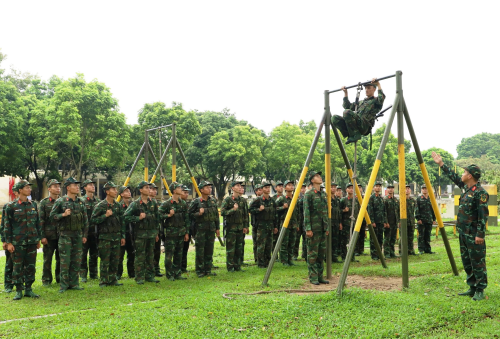In response to the requirements of Army building and Fatherland protection in the new situation, Infantry Officer College No.1 continues to promote its heroic tradition, making itself “exemplarily, typically” comprehensively strong, worthy of one of the leading centres for training and scientific research in the Vietnam People’s Army (VPA).
 |
| Training models exhibited at the opening ceremony for the School’s academic year 2024 - 2025 |
In the past 80 years of construction, combat, and growth (15 April 1945 - 15 April 2025), starting as Anti-Japanese Military - Political School, evolving through various stages as Vietnam Military - Political School, Vietnam Cadre Training School, Tran Quoc Tuan Military School, Tran Quoc Tuan Military Intermediate School, Vietnam Infantry School, and present-day Infantry Officer College No.1 (Tran Quoc Tuan University), under any circumstances, the School has always grasped the Party’s political - military lines, closely following units’ training and combat realities, well performing the task of cadre training. To date, the School has trained nearly 120,000 command and staff officers for the VPA and more than 5,000 military officers for 14 countries. Graduates from the School in all periods have always maintained the School’s traditional values, effectively promoting their acquired knowledge in their positions, truly becoming the core force in tactical-level command and staff work. Many comrades have become high-ranking cadres, generals, and scholars with key positions within the Party, the State, and the VPA. Along with education and training, the School’s scientific research has also achieved positive results, contributing significantly to the development of military science theory, military art, and theory of training and building the armed forces. With its outstanding accomplishments, the School has been honoured with numerous prestigious awards, including the title “Hero of the People’s Armed Forces”, three Ho Chi Minh Orders, five Military Merit Orders, and many other high distinctions. President Ho Chi Minh visited the School nine times and regularly sent letters of encouragement and instruction. Notably, on 26 May 1946, President Ho Chi Minh attended the opening ceremony of the first course at Tran Quoc Tuan Military School and presented the School with a flag embroidered with six golden words “Loyal to Fatherland, pious to people” - which has become the guiding principle for generations of officers and cadets of the School.
The achievements obtained over the past 80 years serve as a solid foundation and a significant source of motivation for the School to continue to promote and fulfil its education, training, and scientific research tasks. In the new era, the School will focus on several key solutions as follows.
First, strengthening all-level party committees and commands’ leadership and direction over education and training. This solution is aimed at ensuring that the School will always adhere to the Party’s lines, the State’s policies and laws on this important work, contributing to training a pool of officers with political willpower, pure ethics, comprehensive capabilities, and scientific work style. Therefore, the School’s Party Committee and Board of Directors (BOD) will continue to deeply grasp and effectively implement resolutions and directives by the Party, the State, the Central Military Commission (CMC), and the Ministry of National Defence (MND) on education and training, with a focus on Resolution 1657-NQ/QUTW, dated 20 December 2022 by the CMC on “reforming education and training to meet the requirements of VPA building in the new context”. Grounded on those documents, the School’s departments, faculties, and units will closely maintain coordination to develop an overall plan including many practical solutions for education and training, with appropriate road map and steps. Emphasis will be placed on reforming training programs and content, developing a corps of teachers and educational managers, encouraging cadets’ responsibility, initiative, and creativity, and modernising teaching facilities and equipment. To this end, party committees and commands at all levels will disseminate the core points and requirements that must be achieved in education and training among all cadres, lecturers, cadets, and soldiers. Due regard will be paid to promoting the combined strength of organisations and forces, especially the role of party committees, key cadres, and commanders at all levels. Additionally, consideration will be given to delegating specific responsibilities to target individuals and organisations, regularly inspecting and supervising their task performance to continuously improve education and training quality and effectiveness.
 |
| Physical training for cadets of the School |
Second, robustly reforming education programs and content to meet practical development requirements. In line with the project of “Renovating training procedures and programs at all levels within the VPA to meet the task requirements in the new situation” and the motto “The quality of training at schools is units’ combat readiness capacity”, the School’s Party Committee and BOD will continue to lead and direct departments, faculties, and units to maintain close coordination to carefully review groups of trainees. Based on those reviews, the School will proactively standardise its training programs suitable to educational levels, fields of study, and each group of learners. Training programs will be reviewed, revised, and updated opportunely to ensure that learning outcomes will be practical, aligned with training objectives, and consistent with the entry standards of higher-level education programs. This will pave the way for an academic credit transfer between programs of similar levels and fields, allowing more flexible utilisation of cadres and cadets upon graduation. Besides, the School will advocate program and content reforms in a direction that reduces time spent on theoretical study while increasing hands-on training, unit-based internships, and self-directed learning; the objective is to ensure systematic coherence within each subject and course. Training programs will be continuously updated with the latest developments in military - defence tasks, including advancements in military science, particularly new forms and methods of warfare observed in recent conflicts and wars around the world, as well as modern equipment and weapon systems. Equal emphasis will be placed on ideological - political education and military training, combining knowledge acquisition with the transfer of real-world combat, leadership, command, and management experience. Cadets will also be trained in morality, lifestyle, discipline, and a strong sense of responsibility. At the same time, the School will actively reform the content, format, and methods of examination and assessment. It will emphasise inspection, supervision, reassessment, and periodic reviews to draw valuable lessons. Violations of training regulations will be strictly handled to ensure the motto of “Teaching with substance, learning with substance, and carrying out evaluations with substance”.
Third, fostering and developing a contingent of lecturers and educational managers. This is an important task that will directly contribute to improving the quality of education and training at the School. Under Resolution 109-NQ/QUTW, dated 11 February 2019, by the CMC on building a pool of military cadres, particularly at operational and strategic levels, to meet the task requirements in the new situation and the Project of “Developing a corps of lecturers and educational managers in the VPA for the period of 2023 - 2030 and beyond”, the School will concentrate efforts on developing and cultivating a contingent of lecturers and educational managers, with sufficient quantity, age balance, comprehensive capabilities, standardised qualifications, and exemplary work style and method in all fields. To this end, the School will require its departments, faculties, and units to prioritise the training and development of their lecturers and educational managers, enabling those staff members to possess modern teaching methods, program development skills, scientific research skills, a good command of foreign languages, information technology, and digital transformation as well as practical knowledge and educational psychology. Additionally, skills in educational management and school administration will be aligned with the requirements of VPA building and international integration. Furthermore, favourable conditions will be created to help lecturers and educational managers acquire postgraduate qualifications, become main lectures and senior lecturers, and achieve the titles of professor, associate professor, People’s Teacher, and Outstanding Teacher. In the process, the School will send its staff for training at military and civilian institutions, encourage self-training, organise in-service training, and deploy its personnel to grass-roots units to accumulate experience simultaneously. On a yearly basis, 5 - 6 cadres and lecturers from the School shall achieve the title of associate professor and be recognised as People’s Teachers or Outstanding Teachers; 15% - 20% of its cadres and lecturers shall be deployed to grass-roots units.
Fourth, promoting activeness, proactivity, and creativity among cadets in their study and training. All-level party committees, commands, cadres, and lecturers will be tasked with regularly educating cadets on their roles and responsibilities. Cadets will be encouraged to take the initiative in self-study, self-improvement, and training, striving to become both “red and expert” officers. They are expected to be constantly inquisitive and innovative in order to meet training objectives effectively. At the same time, cadets will be trained to know how to make the most of the available resources and favourable conditions during their training, with the aim of enabling them to achieve breakthroughs in both personal qualities and capabilities upon graduation. Moreover, cadets will be encouraged to continuously improve their work method and style so that they will be able to work independently, possess regular, exemplary, scientific leadership and management style, and satisfy the expected outcomes of training programs and the requirements for VPA building.
Fifth, ensuring adequate and opportune facilities and materials for education and training. To this end, alongside expediting surveys and accurately assessing its current conditions, the School will proactively mobilise resources to guarantee sufficient training materials, textbooks, and teaching aids. Efforts will be made to build, upgrade, and complete the system of lecture halls and training grounds. Priority will be given to investing in and modernising teaching-related infrastructures and equipment, ensuring practicality, effectiveness, and strategic planning. Investments will be aligned with the overall development plan and available funding to allow accessibility to new technologies and avoid inefficiency or wastefulness. Information technology will be further applied to educational management, teaching activities, and scientific research. In the immediate term, the School will concentrate on developing a training command centre, upgrading its training grounds, and building specialised classrooms and laboratories. Coordination will be maintained to facilitate the shared use of training grounds and military equipment between the School and other units, with a view to optimising resources, improving investment efficiency, and effectively carrying out the “Development plan for the School towards 2030, with a vision towards 2045”.
Bringing into play its 80-year tradition of building, education, training, combat, and maturity, the School will remain proactive in innovation and creativity, promote democracy, unity, self-reliance, and resilience, and overcome all challenges to excellently fulfil its tasks and meet the requirements of VPA building and Fatherland protection in the new situation.
Sr. Col. NGUYEN TRUNG HIEU
Acting Commandant of the School